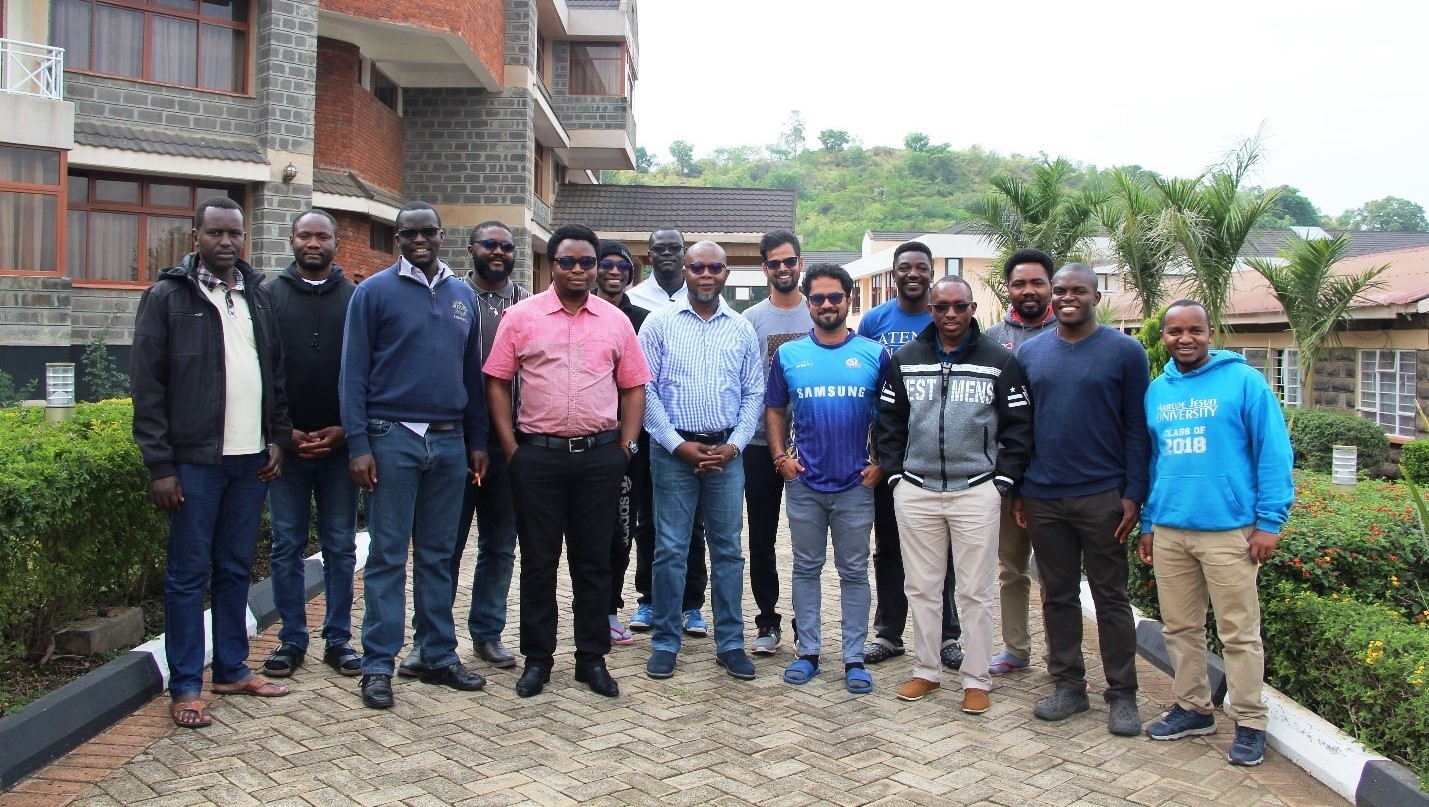
From 10th to 31st July 2022, the 3rd Year Jesuit Scholastics at Hekima held their Arrupe Month sessions in Nakuru county, in the northwest of Nairobi, at about 160km. Enriching talks from various speakers, sharing on vocation stories of all the 14 Jesuit-participants, daily prayers and pilgrimages to holy places, made the 2022 Arrupe Month a wonderful and grace-filled experience. It offered us an opportunity to seriously consider the identity of ordained ministry.
Historically, Arrupe Month, as the term denotes, dates back to 1980 when the then Superior General, Fr Pedro Arrupe requested all major superiors to ‘provide for the scholastics a privileged experience of prayer, reflection and direction, in order to complete the “appropriate spiritual
preparation” required by GC 32. Its purpose will be the further deepening of each one’s commitment to his vocation so that he may make his definitive election about answering the call to ordination with the greatest possible knowledge and freedom.’ (Letter “On Preparation for Ordination,” 27 December 1979, No11). The request came as a resolute response to vocation crises that faced priestly life, and the Church in general, after the Vatican Council II.
Thus, before his priestly consecration, a Jesuit scholastic follows a thirty-days session, reading, reflecting, meditating and praying about the meaning, the responsibility, and the mission of a priest. The Month is a Special- Spiritual Preparation for Priestly Ordination (contrary to the ordinary preparation), aiming at initiating candidates to Sacred Orders after a long period of probation.
This year’s Arrupe Month experience enriched us with talks from various speakers. Among them figured the JCAM President Fr Orobator, SJ, the AOR Provincial Fr Kizito Kiyimba, SJ, diocesan and religious priests, Sisters, and a Brother, a married couple, and Jesuit-collaborators from various Jesuit institutions and missions. The talks were immediately followed by questions- and-answers sessions.
All the speakers discussed the ministry of priesthood from their various perspectives and experiences, trying to formulate an identity of a priest the Church needs in the contemporary world. By so doing, they exhorted us to embody the same characteristics of “the ideal priest”.
The talks were preceded by monthly reflections on the Church and the Society’s documents, from October 2021 to March 2022, putting much emphasis on an identity of a Jesuit priest in the 21st century. The themes of collaboration, holiness, integrity and discernment in our missions, among many were much underscored. It’s worth mentioning, for instance, the shifting, if not an evolution, of the concept “collaboration”.
We are all collaborators in God’s mission and whatever mission we are entrusted with, is God’s mission. The mission doesn’t belong to us, to me or to anybody else; it’s God’s mission and we too, Jesuits, are called to collaborate in this mission like anybody else, including laypeople. Jesuits are collaborators with others, not just the lay people collaborating with us; we too are collaborators with them.
In addition, it’s so inspiring, though sounding like a warning, to experience how families describe an identity of a contemporary Priest: “We don’t just need intellectual or power-hungry priests, or priests who mock and ignore their shortcomings; we don’t want priests who think that without them nothing is impossible to us. We don’t want predators; we want priests who put God in the center of their life, priests who pray, listen, console,
and serve the people. We don’t expect you to be available for any mass we want at home, at any time. We want responsible priests. You are ordained for the universal Church, and not for private individuals or groups. […] We want priests who are available for community masses.
We don’t want priests who come to say mass drunk, or late or disorganized. We need priests who respect themselves, respect others, and know when to help.” The same exhortation focused on moderation and self-control in everything, whenever drinking, eating, visiting people or doing any activity so that we don’t become scandals to others. Warnings against worldly glories such as money, power and related addictions were not left behind.
We were also reminded of our primary mission: to preach the Good News, which of course requires daily meditation on the Word of God. The spiritual preparation avoids giving empty homilies and intellectual preaching that do not touch people’s hearts. We were urged to remain ministers of reconciliation, justice and peace.
Besides the wonderful talks, each participant got an opportunity to share his vocation journey. These 14 beautiful vocation stories made us discover the richness of our lives, and how God has been working in and with each and every one of us in our ordinary lives, though some lived extraordinarily spiritual encounters with God.
Indeed, the rich stories constitute the groundwork of our call, and this foundation should always be cherished. The faith-stories also became a way of knowing one another, and strengthening our companionship as we journey together. The 2022 Arrupe Month Group highly appreciated the availability and generosity of Fr Ernest Ngiyembere, SJ, a Rwanda-Burundi young Jesuit-Priest, who accompanied the group.
His humility, wisdom and experience inspired us through his rich talks, and regular preaching at Mass. The 2022 Arrupe Month took place amidst general campaigns and elections among four presidential candidates to succeed Uhuru Kenyatta, the outgoing President of Kenya, who successfully finished his two terms (8 years) in office.
Among the candidates figured Dr William Ruto, the current Deputy President and Raila Odinga, a veteran opposition leader and former Prime Minister (2008-2013). The winner will serve as the 5th President of Kenya since its independence from Britain in 1963. We pray that the general election results continue to promote and strengthen peace and democracy. May God continue to make us all instruments of Peace and Reconciliation in our various missions.
Pascal Bihorubusa, SJ
